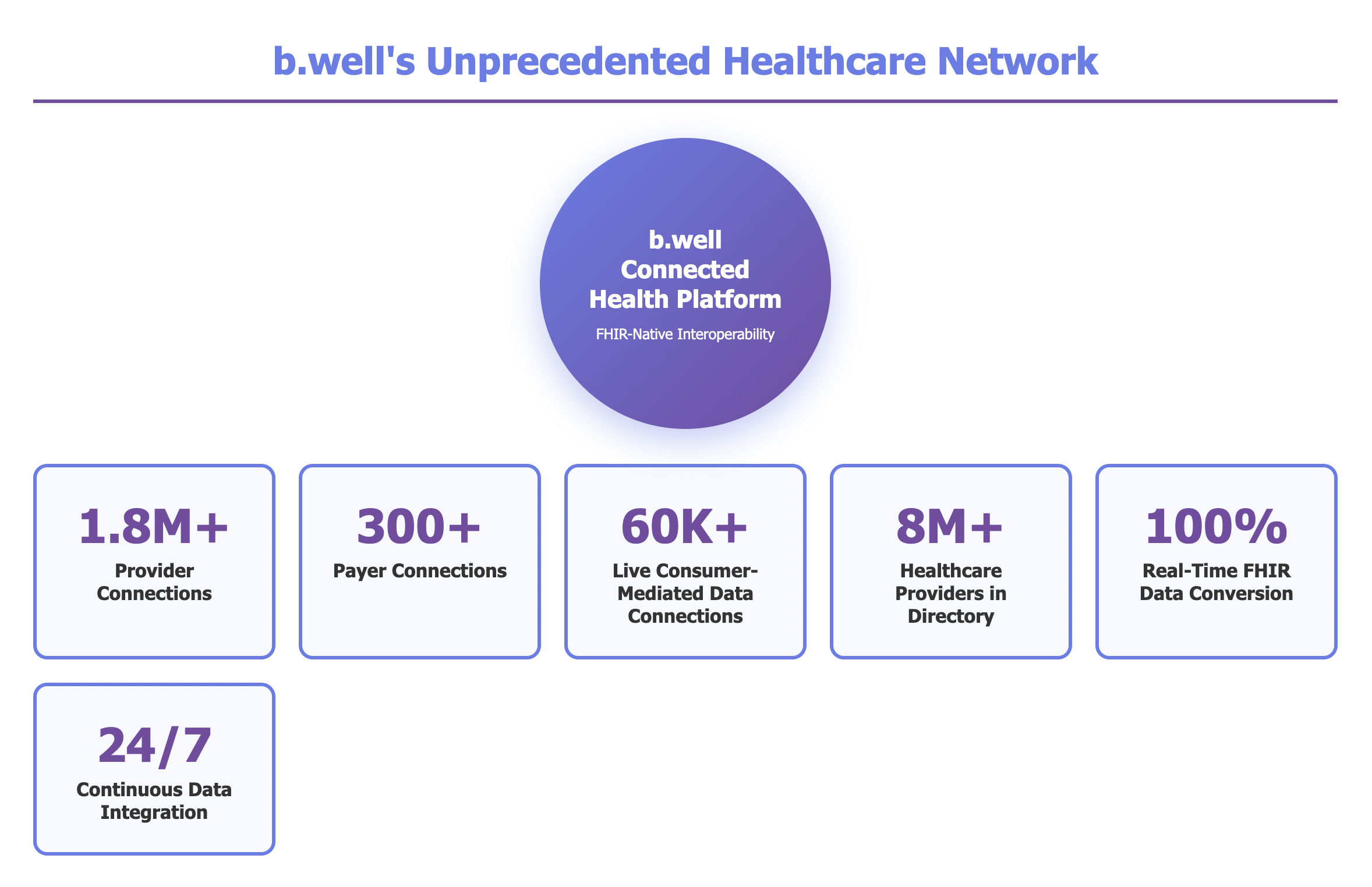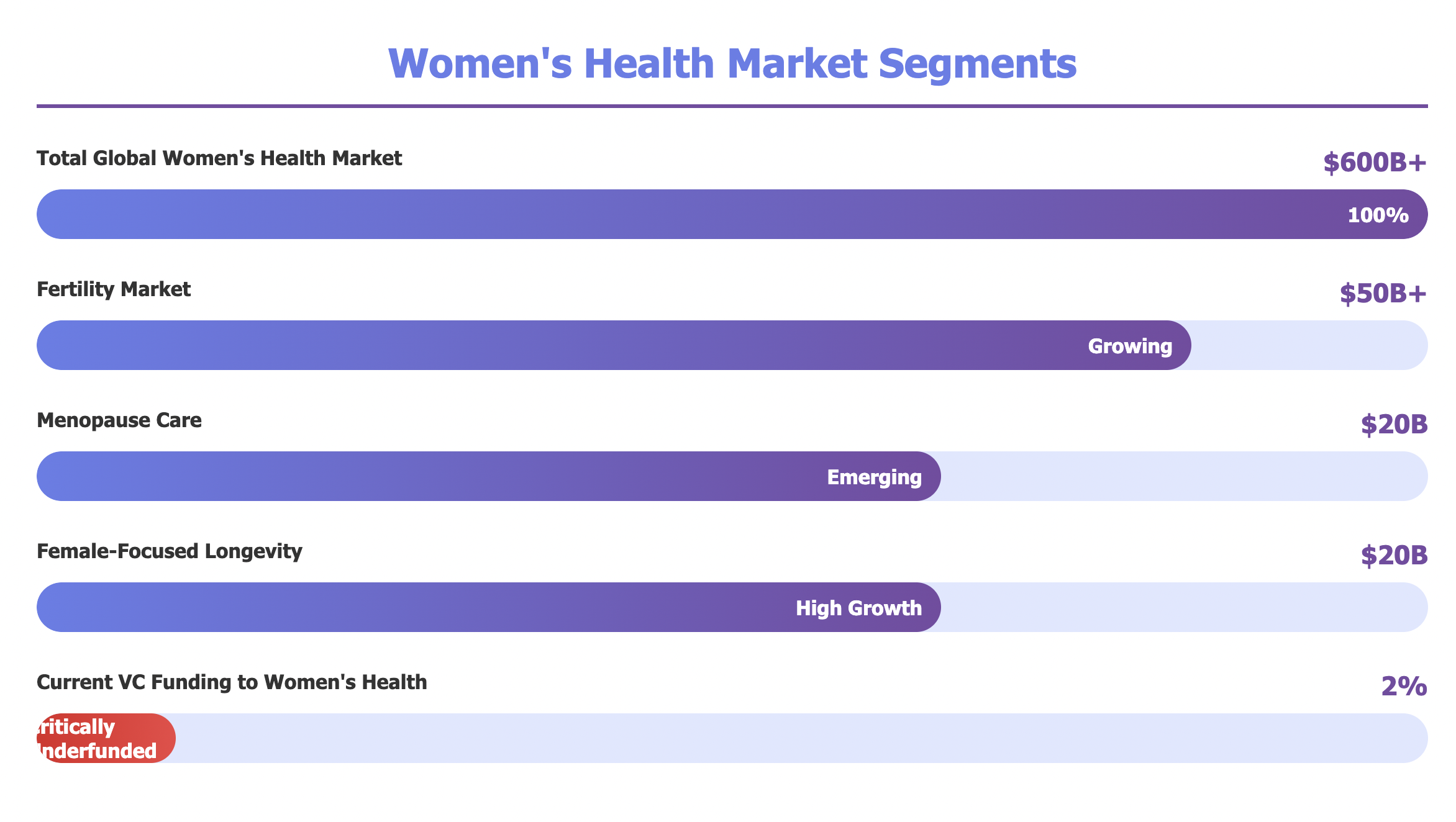November 18, 2025
Breaking Down Barriers: How b.well Is Revolutionizing Women's Health Through True Interoperability?
Learn how b.well Connected Health use unified health data to close gaps in women’s care, prevent avoidable harm, and power better decisions.
Topics
Key Takeaways
✓ 80% of healthcare decisions are made by women
✓80% of maternal deaths are preventable
✓ 3x higher maternal mortality for Black women
✓ 2% of health VC funding goes to women's health
✓ $600B+ global women's health market opportunity
✓ 52% of hospital partners lack systems to receive electronic data
Women make 80% of healthcare decisions for themselves and their families, yet they face persistent gaps in diagnosis, treatment, and quality of care. The consequences are stark: nearly 80% of maternal deaths are preventable, and Black women are three times more likely to die during pregnancy or in the year thereafter than their White counterparts. These aren't just statistics, they represent a fundamental failure of our healthcare system to serve half the population.
At the heart of this crisis lies a problem that's often invisible to patients but catastrophic in its impact: fragmented healthcare data. When a pregnant woman visits her obstetrician, sees a maternal-fetal medicine specialist, and ends up in the emergency room with complications, each provider may be working with incomplete information. Critical medical histories remain trapped in siloed systems, leading to duplicated tests, delayed diagnoses, and missed opportunities to intervene when it matters most.
This is where b.well Connected Health is changing the game and why Portfolia's investment community is paying attention.
About b.well Connected Health
b.well Connected Health is a FHIR-based digital health platform unifying healthcare data and services into seamless consumer experiences. Founded by Kristen Valdes, the company connects over 1.8 million providers, 300+ payers, and multiple health information networks to create the most complete consumer-mediated health data network. As a CMS-Aligned Network, b.well meets federal standards for secure, standards-based health data exchange.
The b.well Difference: FHIR-Native Innovation

Founded by CEO Kristen Valdes over a decade ago, b.well Connected Health has built something that seemed impossible in healthcare: a truly interoperable platform that puts patients not legacy systems at the center. Their FHIR-based (Fast Healthcare Interoperability Resources) digital health platform doesn't just connect data; it transforms how healthcare organizations can serve women across every stage of their health journey.
The platform's reach is staggering: b.well integrates data from more than 1.8 million provider connections, over 300 payer connections, plus connections to TEFCA, Health Information Networks (HINs), Health Information Exchanges (HIEs), labs, and pharmacies—all in real-time. This creates what b.well calls "the most complete consumer-mediated health data network" in the industry.
But connectivity alone isn't enough. b.well's platform goes further by:
- Normalizing and enriching data: Converting all health data formats automatically to FHIR standards, then adding AI-powered insights that surface personalized, science-based recommendations
- Creating longitudinal health records: Building comprehensive patient histories that follow women across providers, pregnancies, and life stages
- Enabling proactive care: Delivering personalized health insights and next-best actions based on each individual's complete health picture
- Empowering patient control: Putting women in charge of their health data with comprehensive consent management and secure access
Solving the Maternal Health Crisis Through Interoperability

For pregnant women, care coordination isn't just convenient; it's literally life-or-death. A typical uncomplicated pregnancy involves obstetric examinations every four weeks for the first 28 weeks, then every two weeks until 36 weeks, followed by weekly visits. After delivery, ongoing postpartum care is essential. Yet fragmented systems mean providers often lack the complete picture they need.
Consider a common scenario: A woman arrives at the emergency department with postpartum complications. Without interoperable systems, the ER physician may not know she's recently given birth, what complications occurred during delivery, or what medications she's currently taking. These information gaps can have devastating consequences.
b.well's platform addresses this head-on by:
- Unifying maternal health data: Chart notes, clinical documents, appointment data, ultrasounds, test results, and care quality metrics become immediately accessible across providers
- Supporting care coordination: The platform enables the delegated access models that allow obstetricians, maternal-fetal medicine specialists, pediatricians, and other providers to work as a true team
- Capturing social determinants: Beyond clinical data, the platform can integrate information about housing stability, food access, and other factors that profoundly impact maternal outcomes
- Enabling continuity of care: A woman's complete health history from pre-pregnancy health conditions through postpartum care travels with her
The result? Providers can identify risks earlier, coordinate interventions more effectively, and deliver truly personalized care that considers each woman's unique health journey.
Beyond Pregnancy: A Whole-Life Approach to Women's Health
While maternal health represents one of the most urgent use cases, b.well's impact on women's health extends far beyond pregnancy.
The platform supports:
- Fertility care: Integrating data from fertility clinics, endocrinologists, and reproductive specialists to support women on their conception journeys
- Menopause management: Connecting gynecologists, primary care providers, and specialists to coordinate care for hormonal changes, cardiovascular risks, and bone health
- Chronic disease management: Helping women with conditions like diabetes, hypertension, or autoimmune diseases receive coordinated care that considers gender-specific manifestations
- Mental health integration: Breaking down the artificial barriers between physical and behavioral health care
- Preventive care: Enabling personalized screening recommendations based on family history, genetic factors, and individual risk profiles
The platform's AI-powered capabilities mean women don't just get access to their data; they get actionable insights. Instead of overwhelming patients with medical information, b.well surfaces what matters most: personalized next steps, relevant educational content, and connections to appropriate care.
Validation Through Leadership and Recognition
b.well's approach has earned recognition from the highest levels of healthcare policy. In 2025, the company became one of the first to commit as a CMS-Aligned Network under the newly launched CMS Interoperability Framework—a voluntary national strategy to modernize data sharing across healthcare.
"This new CMS framework validates everything we have built for and believed in for over a decade," said Kristen Valdes. "True interoperability cannot be achieved through regulatory compliance alone. It requires open standards, consumer empowerment, and a modernized architecture. Since our inception, we have believed that data belongs to patients, that interoperability requires semantic understanding beyond just data exchange, and that consumer-grade experiences are achievable in healthcare when we stop competing on data and start competing on the value offered on top of the data."
The platform's production environment already supports all five CMS-Aligned Network requirements:
- Patient Access & Empowerment through standardized FHIR APIs
- Provider Access & Delegation for comprehensive care coordination
- Data Availability & Standards Compliance with automatic FHIR conversion
- Network Connectivity & Transparency across multiple data sources
- Identity, Security & Trust with HITRUST certification and IAL2-compliant identity verification
The Portfolia Connection: Investing in What Women Need

For Portfolia's investor community, b.well represents exactly the kind of innovation that addresses both market opportunity and mission-driven impact. The global women's health market is estimated at $600+ billion, with high-growth sub-sectors like menopause ($20B), fertility ($50B+), and longevity therapeutics ($20B) yet women's health receives just 2% of health-related venture capital funding.
b.well's platform is infrastructure that enables the entire women's health ecosystem to work better. Every fertility clinic, maternal health startup, menopause care provider, and women's wellness company benefits when patients can actually access and share their complete health data. As Portfolia backs innovative companies like Gameto (transforming IVF), Maven Clinic (virtual care for women and families), and YourChoice Therapeutics (male birth control), b.well's interoperability platform helps ensure these innovations can integrate into women's existing care seamlessly.
The company's recent strategic partnership with RTI International further demonstrates its value proposition. RTI, a major nonprofit research institute, invested in b.well to leverage the platform's ability to connect real-time, real-world data with patient-provided insights—creating the comprehensive picture of patient experiences needed to drive meaningful research and improved healthcare decision-making.
Why This Matters: From Crisis to Transformation
Healthcare's fragmentation problem isn't abstract; it costs lives, particularly women's lives. Every preventable maternal death, every delayed diagnosis of a condition that presents differently in women, every time a woman must tell her medical history to yet another provider who lacks access to her records—these represent failures of our healthcare system.
b.well's vision is audacious: to solve healthcare's fragmentation problem completely. By creating a scalable, FHIR-based platform that unifies all healthcare data, solutions, and services in one place, they're empowering healthcare organizations to offer genuinely personalized experiences. More importantly, they're enabling the creation of longitudinal health records that allow women to receive proactive health insights and conveniently access care for themselves and their families.
As Valdes noted during a CMS panel on interoperability: "Patients want their doctors to have real-time access to all of their data at the point of care, and this access is also vital to population health management and value-based care. FHIR enables us to be able to use data in order to proactively communicate and reach out. And I think that serves the entire community, whether you're an insurance carrier, a provider, or a consumer-facing application trying to add value."
The Path Forward
Healthcare interoperability isn't just a technical challenge—it's a social justice issue. When women control nearly $25 trillion of wealth in the U.S. yet rarely sit at the table as early investors in healthcare innovation, we miss opportunities to fund solutions that truly serve women's needs. When maternal mortality rates remain unacceptably high despite being largely preventable, we need infrastructure that enables better care coordination.
b.well Connected Health represents the kind of foundational innovation that makes other innovations possible. Their platform doesn't compete with women's health startups—it empowers them. It doesn't replace healthcare providers—it gives them the tools to deliver better care. And it doesn't lock patients into proprietary systems—it liberates their data so they can take it wherever their care journey leads.
For Portfolia investors committed to backing breakthrough companies that enhance women's health and lives while delivering strong returns, b.well demonstrates how infrastructure plays can create enormous value while advancing a mission-critical cause. True interoperability isn't just about making systems talk to each other—it's about ensuring that when women need care, their providers have everything they need to deliver it effectively.
In a healthcare landscape where women's health has been systematically underfunded and underserved, b.well's platform represents something powerful: the technological foundation for a healthcare system that actually works for women. And that's an investment thesis we can all get behind.